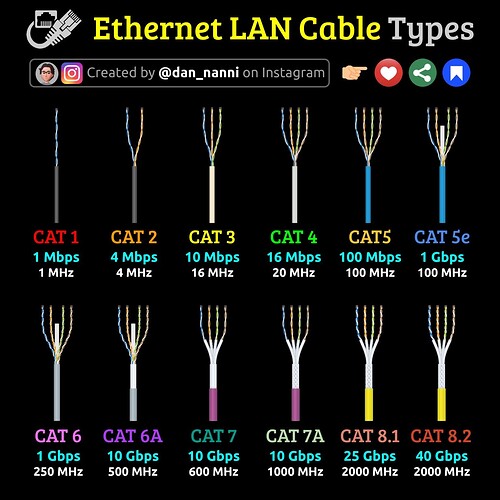When it comes to building a robust network, the type of Ethernet cable you choose plays a crucial role in performance.
Ethernet cables are categorized into “CAT-N”(where “CAT” stands for category) based on bandwidth (measured in MHz), maximum data rate (measured in megabits per second) and shielding.
Here’s a simplified breakdown of different Ethernet cable categories and their key features:
-
CAT 1 :
- Max Speed: 1 Mbps | Frequency: 1 MHz
- Common Use: Designed for telephone systems and outdated communications.
-
CAT 2:
- Max Speed: 4 Mbps | Frequency: 4 MHz
- Common Use: Previously used in early networks like token ring. Nearly obsolete.
-
CAT 3:
- Max Speed: 10 Mbps | Frequency: 16 MHz
- Common Use: Popular in early Ethernet systems (10Base-T).
-
CAT 4:
- Max Speed: 16 Mbps | Frequency: 20 MHz
- Common Use: Primarily found in token ring networks but now rarely used.
-
CAT 5:
- Max Speed: 100 Mbps | Frequency: 100 MHz
- Common Use: Supported Fast Ethernet standards, used in many legacy systems.
-
CAT 5e:
- Max Speed: 1 Gbps | Frequency: 100 MHz
- Common Use: An upgraded version of CAT 5, offering reduced interference and higher speeds.
-
CAT 6:
- Max Speed: 1 Gbps | Frequency: 250 MHz
- Common Use: Ideal for Gigabit Ethernet with better shielding and reduced crosstalk.
-
CAT 6A:
- Max Speed: 10 Gbps | Frequency: 500 MHz
- Common Use: A higher-performance version of CAT 6, supporting 10 Gbps over longer distances.
-
CAT 7 :
- Max Speed: 10 Gbps | Frequency: 600 MHz
- Common Use: Features enhanced shielding for improved performance in high-speed applications.
-
CAT 7A:
- Max Speed: 10 Gbps | Frequency: 1000 MHz
- Common Use: Provides even better shielding and supports higher frequency signals, perfect for cutting-edge use cases.
-
CAT 8.1:
- Max Speed: 25 Gbps | Frequency: 2000 MHz
- Common Use: Designed for data centers with 25 Gbps Ethernet, offering superb performance.
-
CAT 8.2:
- Max Speed: 40 Gbps | Frequency: 2000 MHz
- Common Use: Built for high-speed short-distance transmissions in data centers, supporting 40 Gbps Ethernet. It utilizes specialized connectors rather than standard RJ-45.
-
Quick Tip: Always consider factors like speed requirements, distance, and network setup when choosing the right Ethernet cable for your project!
LinkedIn: ![]()
